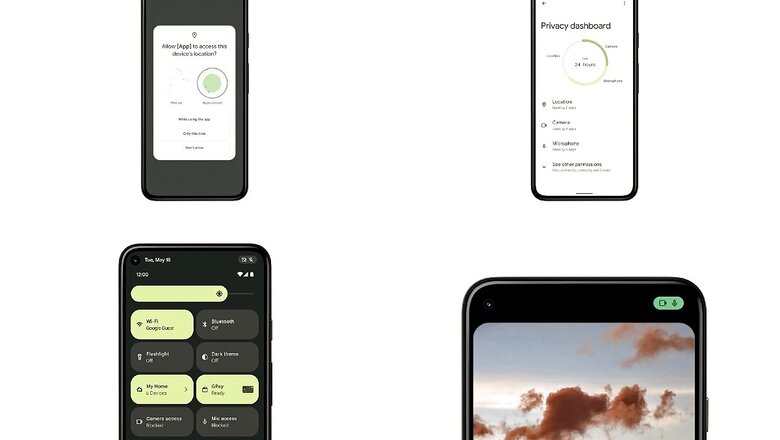
views
Google I/O 2021 has begun, and the introductory keynote was hosted last night. Yet again being hosted with a handful of internal Googlers and no devs or media in attendance, Google chief Sundar Pichai expectedly took to the stage to re-certify that Google takes privacy and security very seriously. While he had quite a few announcements to make, keen eyed observers will likely note how Google glossed over some of the more glaring issues at hand, to instead present a slightly glorified and redesigned take on things that it has already had for a while. Nevertheless, here’s a quick recap of everything related to privacy and security, that Google announced last night.
Android: Privacy dashboard, indicators, Private Compute Core
Google’s big privacy move with Android 12 is a ‘Privacy Dashboard’. To be honest, this isn’t exactly new, but is instead a result of clever interface designing. It brings forth all Android app permissions (including Google’s own system apps) and puts them together in a graphical interface and a quick ‘manage permissions’ tab. It was all there, but is now easier to access for non-tech savvy users. It isn’t a big progress for advanced users, but is innovation in the sense that it makes app permissions more accessible for novice users.
The other new addition were permission indicators, which would show up at the top right to tell you which app was accessing what feature on your phone, in real time. The move is the right one ahead.
A more significant new feature is the Android Privacy Compute Core, which is a localised sector within a phone that is cut off from network access, and serves as the seat for Google’s localised machine learning abilities. All the data being processed here will be localised to just your phone. This helps in addressing concerns around predictive texts and live captioning, and will look to ensure that accidentally sensitive data do not get leaked on to Google servers.
Search: Quick-delete browsing history
With Search, Google previewed a host of machine learning tools through which it claims to be getting even better at preemptive responses. In terms of privacy, Search now has a shortcut tool that you can tap your Google account image on the Google app or in your account settings on your Android phone, to access. The addition brings a one-tap button that will let you delete the past 15 minutes of your activity on Google from the company’s data servers. It doesn’t, however, let you select a browsing mode without being data-tracked at all.
Photos: Locked folder
If you use Google Photos a lot, the app now has a password-locked folder where you can store your private photos. The move is meant to ensure that sensitive photos do not accidentally get published in public libraries.
Maps: Quick-switch location history
On Google Maps, users will apparently find it easier to toggle off Google’s location search history. This, Google says, will look to ensure that users do not feel live tracked by Google’s highly accurate geolocation services. Google has also previewed that it will give users the option to restrict third party apps into getting only their approximate location data, and not precise. The move may work for weather apps and other such services, in order to reduce the number of third parties that can know and track where you are.
Password Manager: Easy import, sync, breach prompt
Google also announced updates to its password manager, which will now make it easier for you to import all your password data to Google from a third party manager, which may be subject to easier breaches. It will also importantly alert users if their password turns up in any repository of breached passwords that turn up anywhere on the internet. In this case, Google will inform a user that their passwords were breached, and offer them single-tap, easy prompts to reset their account details.
User tracking: Differential Privacy, FLoC
Although not new, Google highlighted that it will offer more use cases of its Federated Learning (or FLoC) technology to replace cookies, which has received robust, all-round criticism for not actually being focused on user privacy, and for Google taking too much control in its own hands. Google continues to promise that anonymising user data is enough privacy for now, and will premiere it by offering differential privacy based data to Google Play Store developers. The company says that it will help businesses get the overall idea of where their apps are popular, and target advertisements towards that segment (or cohort) of anonymised users.
Google has also previously promised that it does not track, target or commercialise sensitive data cohorts such as race, religion, medical history and so on, and did so yesterday as well. However, what it failed to do was give users a way to judge the sensitivity of these cohorts by themselves, and potentially, stands at the possibility of more Congressional question and legal sanctions over the sheer amount of control that it holds on user data, all across.
Read all the Latest News, Breaking News and Coronavirus News here. Follow us on Facebook, Twitter and Telegram.




















Comments
0 comment